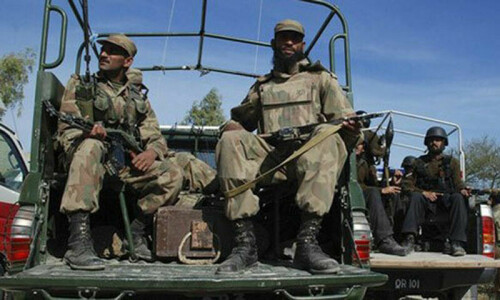ISLAMABAD, June 25: India and Pakistan should normalize ties gradually, focusing on trade and transport links rather than by trying to force the pace on resolving their central dispute over Kashmir, a leading think-tank said.
The Brussels-based International Crisis Group made its recommendations ahead of a meeting between senior bureaucrats from the South Asian neighbours in New Delhi starting on Sunday.
"The atmosphere of mistrust is so intense, the obstacles to peace on both sides so high, that agreement on a comprehensive peace plan in the near future would be near impossible, let alone workable," the ICG said.
While the report, dated June 24, welcomed improving relations since the neighbours pulled back from the brink of war in mid-2002, it warned India and Pakistan against trying to schedule a peace summit too soon.
"Since the foundations of peace have not yet been laid, any attempt to build an edifice after one highly charged summit meeting is likely to fail and could result in worsening tensions.
"The first steps should be to lower tensions and establish closer and sustained links in less controversial areas."
Pakistan and India have already introduced so-called "confidence building measures", including restoring diplomatic relations as well as road, rail and air links.
The ICG called for more steps, including regular contacts between parliamentarians, joint monitoring of the heavily militarised de facto border dividing Kashmir and a more liberal visa regime allowing businessmen freer travel.
Expanding economic links was crucial to the peace process, it said, including boosting trade by cutting tariffs, expanding road and rail links and pushing for a natural gas pipeline from Iran to India via Pakistan.
It urged Pakistan to drop support for militants fighting in Indian Kashmir and said India must end repression there.
Other dialogues needed to be expanded, including between the governments in Islamabad and New Delhi and the capitals of Pakistani and Indian Kashmir respectively, between Indian and Pakistani citizens, and between Kashmiris themselves.
The ICG said the United States should support a broader peace plan for South Asia, rather than intervene at times of crisis as it did in 2002.
It also called on Washington to do more to promote democracy in Pakistan, where Musharraf, a key US ally in its war on terror, dominates the political agenda.
The Pakistani military tends to look at Kashmir more rigidly than elected civilians, has used the Kashmir dispute to justify its powers and has a long history of using Islamic extremist groups for its own ends, the report said.
"The international community, particularly the US and the EU, should accompany more pro-active support for peace with support for the democratic transition in Pakistan," the ICG said. -Reuters













































Dear visitor, the comments section is undergoing an overhaul and will return soon.